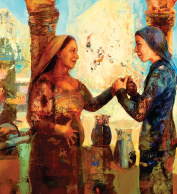STILLPOINT Archive: last updated 11/22/2010
In the 2008 film Baby Mama, a successful woman goes to a surrogacy agency for help in having a baby. She is taken aback when the firm’s director describes her business as a “growth market.” Clearly pregnancy can be underestimated. Is it a mere incubation of a baby? An impersonal service that could be performed by anybody, irrelevant who?
The Church says no. God’s coming to live with us as Jesus of Nazareth, born of a woman, shows us this Mary matters, and the attention the Church gives to her and to her carrying of the Christ Child, suggests that pregnancy matters too. In ancient sensibilities this was scandalous. God, Who is holy, spirit, getting mixed up with the fleshly, the womanly?
These questions touch upon the mystery of the dual nature of Jesus as fully human and fully God. As some churchmen observed, God didn’t have to do it this way: Jesus, the eternal second person of the Trinity, could have come alive full-grown; the second Adam, like the first Adam, coming to earth as an adult, not as a baby.
The Church fathers found it astonishing that God—consuming fire Whom the heavens cannot contain—took Mary’s womb as a throne.
NEXT:
Caryll Houselander’s wonderful Advent book The Reed of God explores this theme:
Working, eating, sleeping, [Mary] was forming His body from hers. . . Walking in the streets of Nazareth to do her shopping, to visit her friends, she set his feet on the path to Jerusalem. Washing, kneading, weaving, sweeping, her hands prepared His hands for the nails. All her experience of the world around her was gathered to Christ growing in her.
In other words, Mary doesn’t just give Jesus a warm oven to gestate in; she grants Him flesh, shares her life with Him. It’s not only that the baby in the womb is special; the act of the mother carrying the baby is special.
You do not just meet your baby after he/she is delivered—or even when you go for an ultrasound, or when the doctor lets you hear the heartbeat for the first time. You meet the baby in quiet moments all the time; your days and nights are shaped by the presence of this houseguest.
At many points in our lives we need to obey the admonition of Jesus—that the one who receives a child in His name receives the Lord Himself; but here it’s pretty literal. We’re not just in the abstract, being asked by God to receive a child, but in a fleshly, demanding way to receive a particular child. “Here, Jackie, meet Caedmon: he’s a very special boy, made in My image; shelter and feed him.”
We get to know our children as we attend to these moments, when communication is still more touch than talk. This is worth as much reflection as we can give it, for the women pregnant with new life and for all of us watching them—wife, relative, neighbor, person in the next pew—in the work God has entrusted to them, on behalf of children known before time, taking shape.
Let’s treasure these things in our hearts: the beauty of your babies, both concealed and known; and the gift of the Savior, spoken to Mary, born for our blessing.
Agnes Howard, Ph.D., assistant professor of English and history, is married to Tal Howard, associate professor of history. The Howards live in Georgetown, Massachusetts, and have three children. This text is an excerpt from a talk, “Annunciation,” delivered in January 2010.
[email protected]

